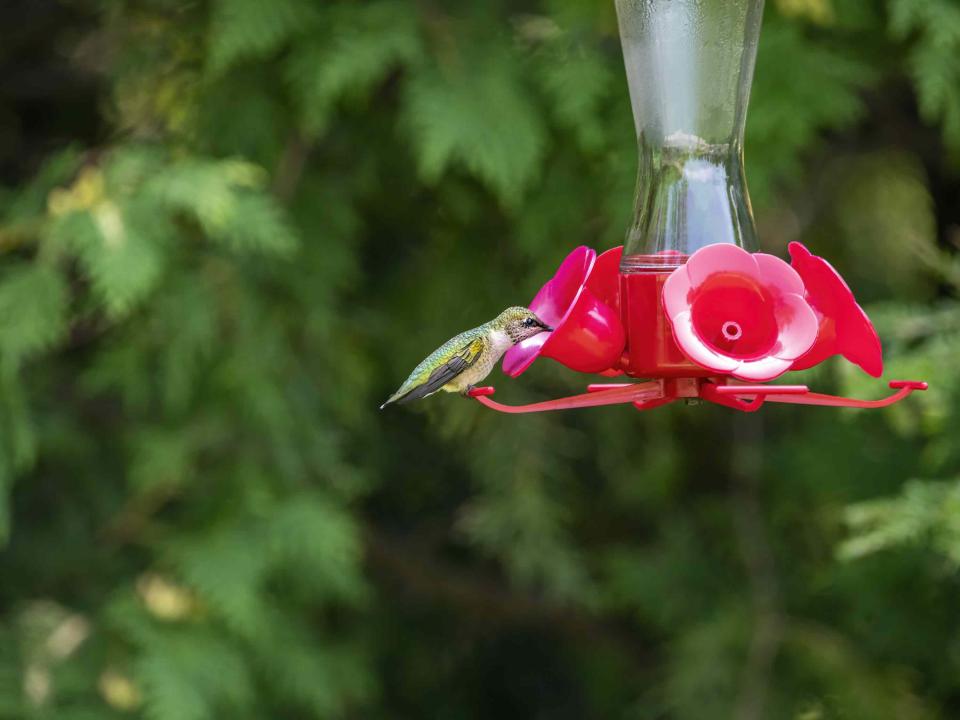How To Keep Bees Away From Your Hummingbird Feeders, According To Experts
Learn how to create a bee-free environment for hummingbirds to feed.

Getty Images / Ali Majdfar
With their jewel-toned feathers and acrobatic flights, hummingbirds are fascinating to watch as they zip around your garden and whir by you with the hum of their fast-beating wings. But lately you’ve noticed that bees and wasps are visiting your hummingbird feeders, too. While nectar-loving insects are beneficial and welcome in the garden, you may not necessarily want them at your feeders—especially if they end up crawling into them and drowning.
You’ve probably guessed correctly that bees and other pollinator insects visit hummingbird feeders because they like the same type of food these tiny birds do. “Bees are attracted to your hummingbird feeder because the sugar water in the feeder is similar to the nectar that bees look for in flowers,” says Becky Griffin, a pollinator health associate wit the University of Georgia’s Great Southeast Pollinator Census. “Sometimes bees may be at your feeder because there are few nectar sources in your area.”
Meet The Expert
Becky Griffin is a pollinator health associate wit the University of Georgia’s Great Southeast Pollinator Census.
Chad Witko is senior coordinator of avian biology at the National Audubon Society’s Migratory Bird Initiative.
Will Bees Keep Hummingbirds Away From Feeders?
Maybe. “Hummingbirds can coexist with most insects in low densities,” says Chad Witko, senior coordinator of avian biology at the National Audubon Society’s Migratory Bird Initiative. “However, aggressive species like hornets and wasps may deter them, especially in large quantities.”
Related: The Best Time To Put Out Your Hummingbird Feeders, According To Experts
Tips for Keeping Bees Away from Hummingbird Feeders
If you’ve started to see bees and wasps visiting your hummingbird feeders, here’s what to do:
Plant bee-friendly flowers in your garden. “The thought is that the nectar of flowers is much more desirable to bees than the sugar water in the feeders,” says Griffin. Bees have lots of favorite flowers, but a few they love include mountain mint (Pycnanthemum spp), butterfly weed (Asclepias tuberosa), bee balm (Monarda spp), and anise hyssop (Agastache foeniculum).
Place the feeder some distance from (not inside) your flower garden, suggests Griffin.
Use a saucer-type hummingbird feeder. “Tube feeders are more accessible for bees to access nectar due to gravity,” says Witko. In contrast, saucer feeders allow the hummingbird to use its long tongue, as long as bees don’t enter and block the ports.
Look for feeders with bee guards, which may deter bees, says Griffin. These are usually fine mesh covers over feeding ports that prevent bees from feeding but allow the birds to stick their tongues through the guards.
Avoid feeders with yellow components. Bees are said to be more drawn to feeders featuring yellow parts, such as artificial flowers or bee guards, says Witko.
Hang up multiple hummingbird feeders. This may mitigate the issue, and it also benefits the hummingbirds, which are territorial about nectar sources and may drive off intruders, says Witko. The more feeders, the more opportunities to host these stunning birds!
Relocate the feeder. Sometimes moving the feeder periodically will keep it relatively insect-free for some time, says Witko.
Clean your feeder at least once a week because drips or leaks attract bees. Use hot water and a small scrub brush to get inside the reservoir and ports, and avoid using soaps, which can leave harmful residues, says Witko.
Change nectar regularly. Nectar can spoil and harm birds. You can make hummingbird food at home by combining four parts boiling water and one part white sugar. Never use any other kind of sugar, honey, or molasses, which could harm the birds. Let the mixture cool, add to a clean feeder, and store leftover nectar in the fridge. Also, don’t add red dye to color the nectar; it’s not necessary, says Witko. (Find the best hummingbird food recipe here).
Never spray pesticides to keep insects away from your feeder. This is harmful to these tiny birds, as well as to the pollinators in your garden.
Related: The 10 Best Hummingbird Feeders Of 2024
For more Southern Living news, make sure to sign up for our newsletter!
Read the original article on Southern Living.

